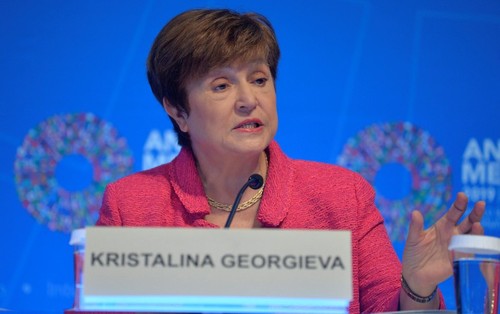 IMF Managing Director Kristalina Georgieva (Photo: Reuters) IMF Managing Director Kristalina Georgieva (Photo: Reuters) |
The International Monetary Fund (IMF) last Thursday warned that the global economy is facing the risk of a prolonged severe recession. Many international financial institutions have issued similar warnings, which reflects the alarming reality that all large economies are seeing slower growth.
Worrisome reality and forecasts
The IMF estimates that from now to 2026, global GDP will lose about 4 trillion USD, equivalent to the GDP of Germany, Europe's largest economy. IMF Managing Director Kristalina Georgieva described the loss as a "huge setback for the world economy".
The IMF says that there are three main factors threatening global economic growth: the energy crisis in Europe due to the Russia-Ukraine conflict, record-high inflation in the US, the world's largest economy, and bad real estate market developments in China, the world’s second largest economy. The IMF has lowered its forecast for global GDP growth to 3.2% in 2022 and 2.9% in 2023.
The World Trade Organization lowered its forecast for global growth in 2023 from 3.3% to 2.3%. The WTO warns that GDP growth could fall even more if central banks raise interest rates too aggressively to curb inflation. Global imports and exports will increase only 1% in 2023, which is less than a third of the previous forecast of 3.4%.
US businesses acknowledge the risk of recession
In a survey of 400 US CEOs published last week by the world's leading auditing firm KPMG, 91% of the CEOs predicted a recession in the next 12 months. Only 34% think the recession will be mild and brief.
The consulting firm Marcum and the Frank G. Zarb School of Business at Hofstra University published a survey in September showing similar results, with more than 90% of CEOs of medium-sized companies in the US saying they’re worried about a recession.
Economists point to multiple indicators that the global economy is entering a recess: the strong appreciation of the USD, the US economy slowing down, the business community tightening spending and investment, the stock market going down, and geopolitical instability increasing in many regions.
Cautious actions
The UN, international financial institutions, and economists are warning governments to be more cautious with inflation countermeasures and pay special attention to their most vulnerable citizens.
Speaking at Georgetown University last Thursday, IMF Managing Director Kristalina Georgieva said that excessive monetary tightening measures will push the world into a prolonged recession. Governments are advised to respond with targeted, temporary fiscal policies to support the hardest-hit groups.
The Annual Report on Global Economic Outlook of the UN Conference on Trade and Development (UNCTAD) warned this month that further tightening of monetary policy and higher interest rates will inevitably cause greater damage. It said raising interest rates does not help much in solving food and energy shortages.
Policy makers should focus on limiting energy prices and tax the windfall profits of energy companies. UNCTAD Secretary-General Rebeca Grynspan said: “There’s still time to step back from the edge of recession. We have the tools to calm inflation and support all vulnerable groups.”